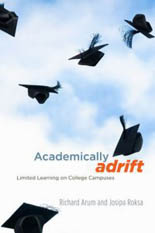
IRIS login | Reed College home Volume 96, No. 2: June 2017
Does College Work?
 Considering the enormous
quantities of time, energy, money, and anguish that are invested in higher
education in this country, you might imagine that we'd have more hard data
about how well it works. Yet research on the true purpose of a college
education--whether it produces an educated person--is surprisingly sparse.
Considering the enormous
quantities of time, energy, money, and anguish that are invested in higher
education in this country, you might imagine that we'd have more hard data
about how well it works. Yet research on the true purpose of a college
education--whether it produces an educated person--is surprisingly sparse.
A major new book on the subject--Academically Adrift, by Richard Arum and Josipa Roksa--presents plenty of data, and the conclusions aren't pretty. Approximately 45% of the undergraduates surveyed showed no improvement in their overall analytical competence after two years of college, and 36% showed no improvement after four years of college.
"Large numbers of U.S. college students can be accurately described as academically adrift. They might graduate, but they are failing to develop the higher-order cognitive skills that it is widely assumed college students should master," the authors write.
The authors, both sociologists, employed several measures to assess the quality of undergraduates' education, including the Collegiate Learning Assessment, and students' own reports of how they spend their time on campus:
"...they spend increasing numbers of hours on nonacademic activities, including working, rather than studying. They enroll in courses that do not require substantial reading or writing requirements; they interact with their professors outside of classrooms rarely, if ever; and they define and understand their college experiences as being focused more on social than on academic development."
The picture of undergraduate education that emerges from Academically Adrift is totally different from Reed when I was a student, and from Reed today, where it's still true that no one graduates without writing--and defending--a thesis. Stroll through the Quad and you'll overhear students debating Plato's Republic. Open the Quest and you'll see a feature on predatory tunicates. The other day I spotted a student in the weightroom underlining passages from an economics paper in between sets.
Arum and Roksa deliberately avoid using the term "crisis" because, as they note, higher education in the U.S. is not really focused on intellectual development. Parents want their children to get a degree. Students want good marks with as little effort as possible. Professors prefer to focus on their own scholarship rather than the dull business of teaching. Administrators are obsessed with rankings.
"No actors in the system are primarily interested in undergraduates' academic growth, although many are interested in student retention and persistence. Limited learning on college campuses is not a crisis, because the institutional actors implicated in the system are receiving the organizational outcomes that they seek, and therefore neither the institutions themselves nor the system as a whole is in any way challenged or threatened."
When I read that paragraph, I feel proud to be part of a college that is so out of step with the mainstream.


LATEST COMMENTS
steve-jobs-1976 I knew Steve Jobs when he was on the second floor of Quincy. (Fall...
Utnapishtim - 2 weeks ago
Prof. Mason Drukman [political science 1964–70] This is gold, pure gold. God bless, Prof. Drukman.
puredog - 1 month ago
virginia-davis-1965 Such a good friend & compatriot in the day of Satyricon...
czarchasm - 4 months ago
John Peara Baba 1990 John died of a broken heart from losing his mom and then his...
kodachrome - 7 months ago
Carol Sawyer 1962 Who wrote this obit? I'm writing something about Carol Sawyer...
MsLaurie Pepper - 8 months ago
William W. Wissman MAT 1969 ...and THREE sisters. Sabra, the oldest, Mary, the middle, and...
riclf - 10 months ago